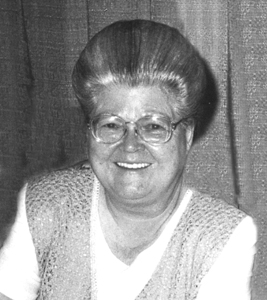NEWS FROM THE HILLS
 Dialect has always fascinated me, especially the mountain variety that was used by our ancestors, and is still in use by many of us today.
Dialect has always fascinated me, especially the mountain variety that was used by our ancestors, and is still in use by many of us today.
Sometimes a word will crop up that strikes a familiar note, although it hasn’t been heard for years.
Criss did a favor for a fellow a few days ago and wouldn’t accept payment for it. As the man turned away, he said, “Much obliged.” That was an expression used quite commonly during my childhood. Instead of “Thank you” or “I appreciate that,” the standard reply was “Much obliged.”
It brought back memories of elderly neighbors who would greet you with “Hirey.” Variations of that were “Hidy-do” and “Howdy.” Of course it all meant the same thing—”How do you do?”
If you replied, “Very well” it did not mean you were on top of the world. It merely meant you were merely so-so. Another expression along that line is, “I don’t care.” When a youngster was offered another piece of cake, “I don’t care” meant, “Yes, I sure do!”
As our early settlers were Scotch-Irish, German, and English, the dialect that was spoken has lingered on in the mountains. Appalachian folk speech is called Southern Mountain dialect by linguists, but could be called Scottish flavored Elizabethan English. Of course some Irish expressions creep in as well.
Daddy used to tell us when we misbehaved that he would take a shillelagh to us. That is an Irish word meaning a cudgel cut from oak or blackthorn, and left rough. (Of course he didn’t.)We did get “whuppins’ though, and as Mom used to say, “There wasn’t a lick a’miss!”
I can remember how Grandma and Grandpa O’Dell greeted visitors. “Come in and get a cheer,” they would say heartily. If it was near mealtime, all visitors had to eat. It was one of the marks of mountain courtesy. Friend or stranger, they had to share the meal with the family.
One of the highest compliments that could be paid to a family was to describe them as “clever.” It didn’t mean that they were skilled or talented, but that they were neighborly or hospitable. Grandma and Grandpa sure were clever.
Our dialect is quite descriptive, with phrases you probably won’t hear outside the mountains. I came in the other day from working in the garden and announced, “I am so tired—I’ve been tearing out the bone.” As soon as I said it, it hit me that it is not a modern saying. We hear it often. Grandma (and my dad) used to say, “I’m plumb petered out!”
We describe a person who is lazy as, “He wouldn’t hit a lick at a snake,” or “He wouldn’t work in a pie factory.” My dad used to say, “He’s not worth the salt that goes in his bread.” Or, “She’s not very work-brickle!”
A woman who has a reputation as a gossip is described as “having a tongue a mile long.” Sometimes it is said, “Her tongue is hinged in the middle and wags on both ends!”
“I’ve been ‘laying off’ to do that,” Criss might announce as he surveys an intended task. These things sound natural to us, but probably falls strangely on ears that were raised outside the hills.
My late mother-in-law, Peach, would say, “They didn’t have a haet (smallest thing) of anything to eat in the house.” They dished up their food in “lifting dishes,” and when the meal was finished, the girls would have to “redd up” the table.
We always used the word “blinky” to describe fresh cow milk that was turning sour. This word goes back to the early 1600s when folks believed in witches and the power of the evil eye. If the milk was glanced at, or blinked at, by someone possessing the evil eye, the milk would turn sour.
Hilda Richards of Fayetteville recalls some expressions that her mother used. She called objects that were useless or no good as “It wasn’t worth a “formed hate.” I am wondering if she didn’t use the word “haet” but what was the “formed?” Has anyone ever heard that expression? Her uncle called his overall jacket a “josey.”
Our dialect has been watered down compared to the way Grandma and Grandpa spoke, yet many of the old words and expressions linger on. We still cling to the old speech forms because our ancestors, the early Scots, English, Germans, Irish and Welsh settled in these hills and mountains, and isolated themselves for generations from mainstream America.
We keep much of the old dialect which has fallen out of use elsewhere. I hope it never dies out completely. It is colorful, salty, and vividly descriptive. I grew up with it, and still use it, although outsiders sometimes look askance and try to hide their grins.
We’ve been a’fixin to go on a camping trip with some of the family. I don’t reckon we will ketch a whole slue of fish, but we aim to have a good time.
- Celebrating 20 Years Of Community At The Stand - April 12, 2024
- First Positive Case Of Chronic Wasting Disease In Indiana - April 12, 2024
- Southwest Allen County Schools Embark On Major Tree Plantings - April 12, 2024


